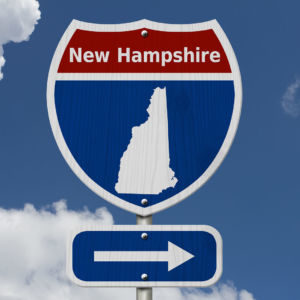It’s an odd political dichotomy: Granite State residents grouse about federal rules forcing them to re-number the exits on the interstate. “I will fight this Washington mandate to the bitter end. #MyNHExit,” tweeted Gov. Chris Sununu.
And yet the state’s Democratic Party is currently waging a full-throated war against local control, voting to override state laws on issues ranging from elections to wages to tax cuts, and all without apology.
“Fed govt has/can/could supersede ANY state law (slavery? Etc…),” tweeted NH Democratic Party chair Ray Buckley in defense of H.R. 1, the problematically-named “For The People” Act, passed by the House without any GOP support. It replaces the state’s election laws with federal mandates on everything from requiring an ID to vote (banned) to having a month-long window for voting — including ballots that arrive days after the election (required).
But H.R. 1 is hardly an exception when it comes to federal law muscling out local control.
For example, all four members of the Granite State congressional delegation voted for the $1.9 trillion COVID-19 package that includes a federal review of state tax cuts.
On Wednesday, a new analysis from Wallethub found New Hampshire has the fifth-lowest tax burden in the country. However, the state’s corporate taxes are among the highest, and Sununu has made lowering those rates a priority. But under the American Recovery Act, any attempt to cut those taxes can be reviewed by the Biden administration, which will now have the power to punish New Hampshire by withholding COVID funding.
In response to a lawsuit from 21 state attorneys general, Treasury Secretary Janet Yellin released a statement claiming “nothing in the act prevents states from enacting a broad variety of tax cuts.” But she also added, “it is well established that Congress may place such reasonable conditions on how states may use federal funding.” And that includes, she acknowledged, determining if states used COVID money to offset revenue lost to tax cuts.
If she decides it was, she now has the power to punish the Granite State for giving tax cuts to its own citizens.
And then there’s the federal minimum wage law. While it was eventually stripped from the Biden spending package, both Reps. Annie Kuster and Chris Pappas voted to force a federal $15 minimum wage on New Hampshire, despite the state legislature repeatedly rejecting it. Opponents of the wage hike, including Democrats like Sen. Joe Manchin (W.V.) say they don’t oppose a minimum wage but rather a “one-size-fits-all” wage increase imposed by Washington.
There are more examples of federal action in traditionally — some would say “constitutionally — state government areas, from gun laws to local education. And New Hampshire Democrats have made the strategic decision to be on the side of DC-based regulation.
State Rep. Paul Bergeron (D-Nashua), a key member of the House Election Law Committee, told NHJournal he supports H.R. 1 and Congress’s decision to supersede state laws, including the ones he helps craft on his committee.
“They want to have a national standard for federal elections and I think they have the right to do that under the [U.S.] Constitution. They have broad authority to protect the right to vote.”
Bergeron says he supports both the process — federal law regulating elections — and the specifics, like mandating states allow voting without an ID. “I’ve worked in nursing homes in Nashua where people don’t drive anymore. They don’t have a photo ID because they don’t need one. More and more young voters are showing up without driver’s licenses, too. They just don’t drive.”
Asked about the argument that states and their elected officials should make those decisions and not Washington, Bergeron suggested the question should be turned around.
“What right do states have to impose their rules on elections for federal office?” he asked.
Sen. Jeanne Shaheen agrees. “Federal law does supersede state voting laws when it comes to federal elections,” she said Tuesday — an argument local Democrats have been aggressively advancing since H.R. 1 passed. The chairman of the party even compared New Hampshire’s election laws to slavery.
“HR 1 has ZERO to do with NH’s FITN Primary/Prez nominating process,” NH Democratic Party chair Ray Buckley tweeted. “Fed govt has/can/could supersede ANY state law (slavery? Etc…). To confuse the two issues is utterly shameful.”
The Democrats’ decision to acknowledge they’re taking control of local elections and giving it to Washington is a politically risky move. As Bergeron acknowledged, “New Hampshire doesn’t have a voting problem.”
But if, as the saying goes, all politics is local, Democrats may have a voting problem in 2022 of their own.




